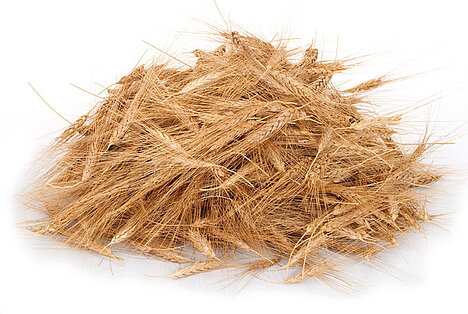Wheat protein

What is wheat protein?
Wheat protein, also known as gluten or seitan, is a protein that consists of the gluten protein of wheat. It has a high biological value, i.e. it contains all the essential amino acids that the dog's body cannot produce itself. It also has a high water-binding capacity, which means that it can absorb and retain a lot of liquid. This gives it a meat-like consistency and a high satiety effect.
Wheat protein is usually extracted from wheat flour using a special process. The flour is kneaded with water to form a dough and then rinsed under running water. The starch and other soluble components are removed and only the gluten remains. The gluten is then cooked, dried or fermented to obtain various forms of wheat protein.
What are the benefits of wheat protein for dogs?
Wheat protein has several benefits for dogs that make it an interesting ingredient in dog food. Firstly, it is a good source of protein that can help build muscle and keep dogs healthy. Secondly, it is a sustainable and cost-effective alternative to animal protein, which often comes from factory farming and can be contaminated with antibiotics or hormones.
Wheat protein can also be suitable for dogs that suffer from a meat allergy or should be fed a vegan or vegetarian diet for ethical reasons. However, care should be taken to ensure that the dog still gets all the nutrients it needs and that it does not develop an intolerance to wheat or gluten.
What are the disadvantages of wheat protein for dogs?
Wheat protein also has some disadvantages for dogs that should not be ignored. For one thing, it can lead to digestive problems if the dog gets too much of it or is not used to it. Possible symptoms include flatulence, diarrhea or vomiting. On the other hand, gluten intolerance or allergy can occur, which can manifest itself in the form of skin rashes, itching or hair loss.
Wheat protein is also not a complete substitute for animal protein, as it does not contain some nutrients or only contains them in small quantities. These include, for example, taurine, iron and vitamin B12. These must be supplied to the dog in addition to avoid deficiency symptoms.
What should you look out for when feeding wheat protein to dogs?
When feeding wheat protein to dogs, there are a few points to keep in mind to minimize potential risks and maximize the benefits. Here are some tips:
- Introduce wheat protein slowly and in small amounts to get the dog used to it and not overwhelm their digestion.
- Pay attention to the quality and origin of the wheat protein. If possible, it should be organically grown and free from pesticides or heavy metals.
- Choose a dog food that contains wheat protein as one of several protein sources and not as the main ingredient. This will ensure that the dog gets a balanced diet.
- Supplement the dog food with other nutrients that are missing or only present in small amounts in wheat protein. These include taurine, iron or vitamin B12, for example. You can use special supplements or natural foods such as yeast, algae or liver.
- Observe your dog for possible signs of intolerance or allergy to wheat protein. If you notice any, change the food.
Wheat protein is a plant-based protein that can have some benefits for dogs, but also has some drawbacks. It can be used as one of several protein sources in dog food, but should not be used as the sole or main source. You should also pay attention to the quality, quantity and composition of the dog food and monitor the dog for possible intolerances or allergies. Wheat protein for dogs can therefore be used sensibly and safely.
If you notice any signs of hypersensitivity or poisoning in your dog, you should see your vet immediately. We are not a substitute for a vet, but we try to be as accurate as possible. Every dog reacts differently and we recommend you get a second opinion or consult your vet if in doubt.
Stay healthy and take good care of your four-legged friend!😊